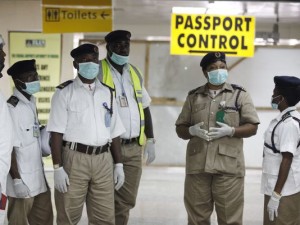Could Ebola be the making of Nigeria… or at least tool of its rebranding?
Can a deadly epidemic mean better political health? For a country’s image? It’s a moot point as Nigeria prepares to dispatch a few hundred volunteers to Liberia, Sierra Leone and Guinea, the three West African countries most affected by Ebola.
One of the BBC’s Africa editors, Mary Harper, was on the radio on Thursday, raving about Nigeria’s response to Ebola.
When she flew in to the giant of West Africa, she explained, she was impressed by the thoroughness with which her temperature and that of other arriving passengers was taken. This was followed by other tracking procedures.
“We had to fill in a complicated form, explaining where we had come from…it even asked for the seat number (on the plane),” said Ms Harper.
It was an unusual testament to Nigerian efficiency, of which the world knows little. Though not exactly related, Nigeria’s ranking actually worsened from 2013 to 2014 on the World Bank’s ‘Ease of Doing Business’ list.
But that may be neither here nor there.
When it comes to Ebola, Nigeria seems to have rallied magnificently to coordinate its response, so much so that it can almost be seen as a model – regionally and even internationally.
As Oyewale Tomori, professor of virology at the Nigerian Academy of Science, recently said in The Guardian, the country’s initial response to Ebola was flawed, being a couple of weeks late.
But once started, it worked very well, he said, because Nigeria simply went down a tried and tested route, namely polio eradication measures.
It mimicked its own polio response, said Professor Tomori, setting up an Ebola emergency operation centre in Lagos and reassigning 40 Nigerian doctors trained in epidemiology. “This centralised hub coordinated the Nigerian health ministry, the World Health Organisation, Unicef, the US Centers for Disease Control and Prevention, Médecins sans Frontières and the International Committee of the Red Cross.”
The results were impressive, with 1,800 health workers eventually trained, protective gear provided, and safe wards with enough beds and access to chlorinated water set up.
The end result is that Nigeria is now officially Ebola-free. And being heaped with praise.
Which brings us back to the original question. In answer, here’s a little story.
Nigeria’s celebrated playwright and poet Wole Soyinka is on record lamenting his country’s oil wealth.
“I’m convinced that Nigeria would have been a more highly developed country without the oil. I wished we’d never smelled the fumes of petroleum,” he once said. The reference is recognizable. The oil boom, which began in the 1970s, had ugly consequences – massive corruption, mismanagement, trade in stolen oil and resulting violence in the Niger delta, the home of the industry.
It’s true that natural wealth can often impoverish a country, especially one with poor governance and scant respect for rule of law.
Sometimes though, the converse can be true. A deadly epidemic can be good news.


